- Home
- William H. Keith
Android: Free Fall Page 3
Android: Free Fall Read online
Page 3
He’d taken a temporary leave of absence from the firm four months ago in order to go to work for Humanity Labor. That was fairly routine in the lobbying game. Made having private tête-à-têtes with senators and representatives seem a bit less rabidly commercial. He was being paid well—very well—by Humanity Labor for hobnobbing with government officials and suggesting just how certain laws ought to be worded. He was also the author of a number of passionate Net articles on anti-simulant legislation.
I wondered what he really thought. It was anyone’s guess whether he actually believed the Humanity Labor party line; give a guy that much money and he’ll say he believes in Santa Claus and the Tooth Fairy. Hell, he’ll swear out an affidavit that he saw both of them consorting with the Easter Bunny.
The tube-lev trip lasted just twenty minutes. A minute before arrival, the translucent attendant reappeared to tell us to stay put and buckled in, and our seats rotated in place so that we were facing back the way we came. Then that invisible, eighty-kilo lummox was sitting in my lap again as we decelerated into the Root. The doors gulled open, and I stepped out into the heart of Cayambe.
Many years ago, the economy of the tiny South American nation of Ecuador was failing. At the same time, the United States government was looking into building a space elevator—the Beanstalk, a structure 70,000 kilometers high including its main facility (the space complex known as Midway) at geosynchronous orbit, 35,784 kilometers up. They needed a spot smack on the equator to build the thing, and after considering anchoring it to an artificial floating island at sea, they settled on the third-highest mountain in Ecuador, a glacier-clad mountain in exactly the right spot.
The United States purchased 75,000 square kilometers of land from Ecuador for something like a trillion dollars spread over twenty years. That amounted to about one quarter of the country’s total area, including most of the coastal plain between the Andes Mountains and the ocean. Quito, two hundred kilometers inland, became an international gateway city, still the capital of Ecuador, but also a dwarfed suburb of the sprawling megapolis that became the city of New Angeles.
The influx of hard credit had saved the country, of course, and created the ground-side link of what eventually became known as the Beanstalk. New Angeles became the means of cheap access to space. Cayambe, sixty-four kilometers northeast of Quito, was the Beanstalk’s Root.
I rode the elevator up from the tube-lev station, past level upon level of upscale mall boutiques, restaurants, and city services buried inside the mountain, emerging at last into the brisk, thin openness of the Plaza del Cielo.
As many times as I’ve gone up-Stalk, the view from the Plaza never fails to get to me. It’s literally breathtaking…though a lot of that is due to the fact that the outside air is so damned thin 4,700 meters above sea level. Older folks have to wear masks when they leave the under-mountain facilities, though it doesn’t bother people with Freitas respirocytes in their bloodstreams or the appropriate G-mods to their lungs.
It’s the only spot on Earth’s equator with a permanent ice cap, though the facility’s big helium-3 reactor heats the surrounding air enough to keep the Plaza itself ice-free. North, the main peak of Cayambe rises above the Plaza for another thousand meters, ice-covered and dazzlingly brilliant in the clear, thin air. East, morning sun glints off blue-white ice in a dazzling flare of light; beyond, the ground drops away toward the vast and sprawling Amazonas agroplexes of Sucumbios District and, beyond that, southern Columbia and northern Peru.
I didn’t spend much time looking at ice, though. Like any rubbernecking tourist, I tilted my head back and looked…up.
Imagine a tree—with a trunk twenty meters wide and seventy thousand kilometers high—planted smack on an equatorial mountaintop at an altitude of 4,700 meters. The Beanstalk had started as a buckyweave strap one meter wide, woven meter by meter by the constructorbots as it was lowered out of the sky all the way down from synchorbit, over 31,000 kilometers overhead. Nowadays, the structure’s main body was as thick as one of its elevator cars was long, with multiple magnetic tracks around the circumference for up- and down-Stalk pods. Dark gray in color, it arrowed from the mountaintop Plaza into an impossibly deep, blue zenith, dwindling up and up and up until it vanished from sight. A beanpod was coming down now, a vertical cigar-shaped vehicle riding a superconducting mag-lev line gently down the Stalk and vanishing into the elaborately domed and tower-proud roof of Earth Station at the center of the Plaza. A moment later, a much larger car descended on a different track—a cargo pod hauling three monster canisters of helium-3.
New Angeles’s life blood, all the way down from the Moon.
The sight was…dizzying, by far the largest man-made structure ever built, whether measured by height, mass, or volume. At night, even out on the waterfront districts of Manta or Guayaquil, over three hundred kilometers away, you can see the Stalk clearly, a razor-slash of light, laser-beam straight, descending from halfway up the sky to the horizon. New Angelinos are proud of that streak of starlight; we’re the only megapolis on Earth to reach all the way up and really touch the sky.
The Plaza was crowded today with several hundred people—most of them squeezed together in an angry, gesticulating mass. Several waved crudely lettered signs for the benefit of the media—things like “NO CLONES” and “HUMANS FIRST,” “LA TIERRA POR HUMANIDAD,” and a badly spelled “CLONS GOT MY JOB.” The mob appeared to be playing it up for a number of newsies nearby, identifiable by the small, silver monocams each wore over one eye. Several bored-looking yellow jackets—the Beanstalk’s mercenary security cops—stood off to one side, watching with folded arms and holstered weapons.
Except for the news media and the guards, it didn’t look like the demonstration was garnering much attention. Human First pulled this sort of stunt every so often, bringing in a paid mob to make noise and wave signs for the benefit of the next set of newsrag editions. By crowding together that way, the mob looked a lot bigger and more impressive in-vid than it actually was.
Possibly Humanity Labor was trying to set the stage for the planned Congressional summit later. Too bad Dow’s death hadn’t been announced. It might have saved some of the screaming crowd members sore throats and hoarse voices.
I walked through the high, wide transplas doors of Earth Station’s eastern portal. The security gate pinged my badge and let me go through without paying for a ticket…but this time I had to walk through the backscatter arch. Nobody can avoid getting scanned upon entering the Beanstalk. They checked me out down to the skin with x-rays…then added the ultrasound overlay to make sure I wasn’t carrying anything nasty in my stomach or colon. The New Angeles Transit Authority takes security on Cayambe very seriously. Ten years ago, a Martian terrorist managed to get onto a beanpod with three kilos of surgically implanted exotic explosives in his belly. The pod hadn’t been damaged—those things are tough—but eight passengers had died, and the blast had made a hell of a mess on the first-class pod’s dining deck.
I knew. I’d been part of the official response team.
My pod was leaving in thirty minutes. I caught the slidewalk across the Grand Concourse that would take me to the departure platform.
“Rick! Rick Harrison!”
I turned and saw a young woman running toward the slidewalk, elbowing her way through the crowds with consummate and practiced skill. Legs up to here and auburn hair down to there…and as deadly as fifty-eight kilos of antimatter in a leaky containment field.
“Hello, Lily,” I said.
Lily Lockwell jumped onto the slidewalk, nearly knocking an elderly Mestizo couple off as she did so.
“Excuse me! Excuse me, please. ¡Perdón! Rick! What a wonderful surprise! What are you doing here?”
She’d been born Lilith Ramón, but taken the ridiculously alliterative name of Lily Lockwell as a part of her transformation into a high-powered media-star. She was a roving reporter both for the New Angeles Sol and for NBN, and her work was syndicated through a dozen sate
llite network affiliates and twice as many newsrags.
Dawn had warned me about talking with her, warned me to tell her “no comment,” but if I told her that she’d know I was on a case. I decided to give her a little harmless misdirection instead.
“Sightseeing,” I replied. “What else?”
“You never sightsee, Rick,” she told me. “What dug you out from behind your desk?”
“Just checking on a couple of my people,” I told her. “We’re stretched pretty thin right now.”
“So…you going up-Stalk? Or coming down?”
“Up,” I admitted.
She brightened. “So am I! We can travel together!”
This I did not need. “I don’t think so, Lil. Not this time.” I patted my PAD hanging in its holster. “I…have some work to catch up on.”
“Nonsense! When do we ever have time to see one another? This is perfect!” She took my arm and stepped a little closer. “We could even get a private cabin on a first-class pod. My expense account will stretch that far.”
I decided that my safest bet was to go on the offensive. “So why are you up-Stalking? Where are you headed?”
She made a face. “Work. What else?”
“That rent-a-mob outside?”
“Nah. There’s a big meeting tonight. Carousel Boardrooms. Senator Rivera and Senator Suarez both are coming up with some Angelino bigwigs. Some senators and representatives on the Congressional Oversight Committee on Workers’ Issues are subbing in from D.C. Formal dinner, the works.”
I grinned. “I think I read something about that.”
“I’m touched that you still follow my pieces.”
We stepped off the end of the slidewalk. My gate was just ahead.
She lifted a hand and brushed a few strands of that glorious auburn hair back from her face. “You know, Rick, I thought by now we could be honest with one another.”
“Of course we can…”
“Then why are you lying to me?”
“What lying?”
She gestured at the heavy silver case in my hand. “If you’re just ‘checking up’ on a couple of your people, why are you dragging along an NAPD evidence kit?”
Burned. I winced. “They are on a case…”
“And have access to NAPD equipment both in Heinlein and on the Stalk. You also have that look.”
“Look? What look?”
“The ‘I’m on a case,’ look. Distracted. A million klicks away.”
Lily always could read me, damn it. Hell, she can read anybody. It’s part of her job description.
But she knew me way too well, both on and off monocam. We’d been lovers for a while—still were, I guess, though finding time to spend together between her career and mine tended to make it a hit-or-miss affair. I’d known her for years—she was one of NBN’s brightest crime-reporting stars and we were always running into her during field investigations and at crime scenes. But we’d become close after Nina left me, something to do with that yawning black hole of emptiness I’d been carrying around inside, I suppose. One thing had led to another, and…
Something occurred to me. Reaching down, I pulled my PAD from its thigh holster and thumbed it on. I’d been pinged recently, though I had it set not to alert me. The record was there, though, and included the pinger’s ID.
“So,” I said easily, “why are you lying to me?”
“I’m not!”
“Well, not in so many words, no. But that was a very nice act just now, shouting and waving and telling me what a surprise it was to see me.”
I showed her my PAD screen. Lily had pinged me thirty-five minutes ago while I was still on the Metro, then again twenty minutes later while I was out on the Plaza, and, finally, a third time just moments before she’d spotted me on the slidewalk.
“Stalking me?” I asked. “Maybe using a locator app to track me?”
She looked angry…and, believe me, only redheads can put that much pure fury into a glance.
But I didn’t let it burn through my armor. “How’d you know I was going to be here, anyway?”
“I checked in with Fuentes at the NAPD front desk, of course. He told me you’d be here. But I wasn’t stalking you, for Christ’s sake. Don’t flatter yourself, Codfish.”
“Don’t call me that.” If I ever found out who’d told her about that…
“You’re on a case, Rick, and the Commissioner won’t give me the time of day.”
“And Fuentes isn’t supposed to.”
“But you are on a case, and it’s a big one if you’re keeping it this quiet. So what’s going down? Or up, as the case may be.”
“No comment.”
“Aw, c’mon, Rick. Off the record?”
“It’s not worth my job.”
“There’s a rumor floating around that the big Congressional summit tonight is going to be called off. Any comment?”
“Nope. Let me know how it turns out.”
“Damn you, Rick…”
“I am sorry, babe.” I looked into those deep, liquid eyes and decided to relent just a little. “Look, maybe we can talk later.”
“You can forget about that private cabin.”
“S’okay. It’s a short trip. We wouldn’t have time to get real friendly…”
“Yeah? When did you ever have time for more than a cuiqui?” The Andean slang meant what it sounded like.
“You don’t have to get nasty.”
She turned and fumed off, leaving me by the boarding gate. I admired the rear view for a moment until she was lost again in the crowd, then shrugged and boarded my pod.
She’d get over it. She always did.
A typical passenger pod—the kind without first-class accommodations—is twenty-one meters long and contains three passenger decks, located in the middle and each about five meters wide. Inside the pointed ends, top and bottom, is the environmental gear—air and water tanks, heating and air conditioning units—and the radar for the paraglider ram-chute hidden amidships, just in case something goes wrong. Nothing ever does, of course. Space elevator safety systems are as close to foolproof as it’s possible to get.
Each deck held twelve deeply cushioned seats set around the deck’s circumference. Opposite the entryway, the wall swelled inward, taking a bite out of the circular deck. That was the deck’s restroom, and there was a beverage dispenser located on the outside of the cubicle door.
I found my seat, stowed my evidence kit in a cabin locker, and strapped myself in. Eight of the other seats were occupied—two rather obvious businessmen buried in their PADs, a young noirie couple lost in one another, a soldier in uniform, a mother and her six-year-old child, and a clone in a gray-green Melange Mining uniform jumper. I brought up the time display on my wrist. Not long now.
A few minutes later, another holographic attendant flickered into visibility on the center of the deck, recommending that we stay seated and strapped in whenever possible. The curving, opaque walls all the way around suddenly turned transparent, displaying a three-sixty vid projection relayed from cameras strategically located on the pod’s outer hull. We were already moving up through the open roof of Earth Station and into the brilliant, mountaintop morning light. The broad, circular Plaza del Cielo dropped away rapidly as the feeling of weight slowly increased, until it felt like someone half my weight was sitting in my lap. Seconds later, we were above the highest of Cayambe’s ice-shrouded peaks and still accelerating.
We were on our way up-Stalk.
Chapter Three
Day 1
Not everyone can handle heights.
I heard that once, maybe twenty years ago, a beanpod started up-Stalk and they had the deck set to display the view down—nothing but emptiness beneath the passengers’ feet—down, down, down all the way to the clouds far below, then the cloud-shadowed mountains below that. One passenger reportedly went into a panic attack, injured two other passengers who tried to help him, then went into cardiac arrest and died. They reversed the pod and broug
ht them back down, of course, but by the time the med-assist personnel arrived, the man was brain dead, beyond the reach of even the best resus-techs.
My fellow passengers seemed to be handling the ascent okay…all, that is, but the soldier. His breath was coming in short, gulping gasps, his eyes were shut tight, and he was gripping the arms of his chair with a white-knuckled ferocity that threatened to peel them back off their mounts.
The wall behind him showed a rapidly deepening blue sky as we punched up through the highest cirrus layers. On the north side of the pod, of course, behind the restroom, the view was blocked by the blur of the Beanstalk itself, but in every other direction you could already see a distinct curvature to the horizon, and sunlight blasted the pod’s interior with brilliant intensity.
The kid was whining to his mother about being heavy. It promised to be a long hour.
The soldier, strapped in on the other side of the deck, was a private second, and the rank chevrons on his black uniform looked so new they squeaked. He couldn’t have been over eighteen, and I figured he’d probably just gotten out of Basic. Maybe he was visiting someone up-Stalk, a relative or a girl or someone, while he was on boot leave. His e-ID identified him as Kaminsky, Raul, PV2, and gave a long serial number and no other information. He was breathing so hard, I thought he was going to hyperventilate.
All soldiers have their blood infused with respirocytes during Basic; it turns them into super-soldiers and vastly improves their endurance and physical performance. Even with the technical assist, though, it’s still possible to blow off too much carbon dioxide, raise the alkalinity of the blood, and start shutting down blood flow to the brain. Hyperventilation isn’t caused by too much oxygen in the blood; it’s brought on by too little CO2.
His eyes were starting to glaze.
“Private Kaminsky!” I snapped, putting my best parade-ground rasp into the name.

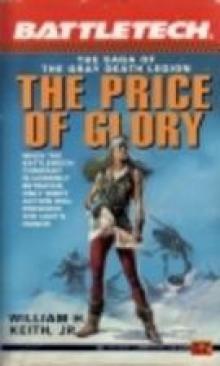 The Price of Glory
The Price of Glory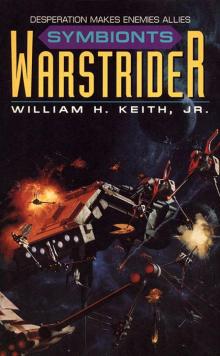 Symbionts
Symbionts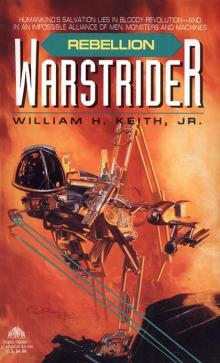 Rebellion
Rebellion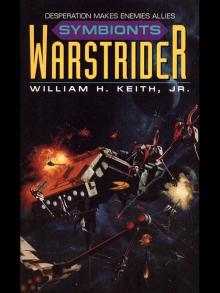 Warstrider 04 - Symbionts
Warstrider 04 - Symbionts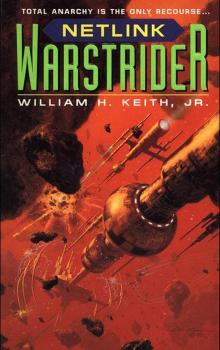 Netlink
Netlink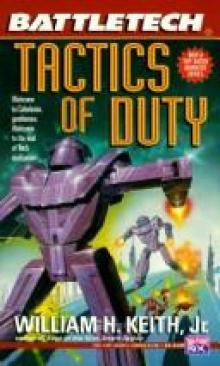 Tactics of Duty
Tactics of Duty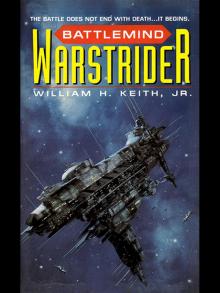 Warstrider 06 - Battlemind
Warstrider 06 - Battlemind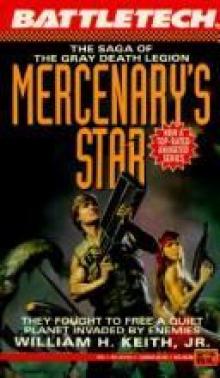 Mercenary's Star
Mercenary's Star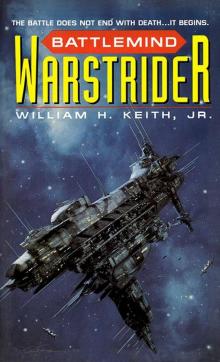 Battlemind
Battlemind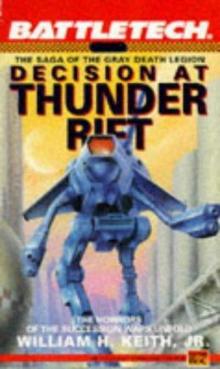 Decision at Thunder Rift
Decision at Thunder Rift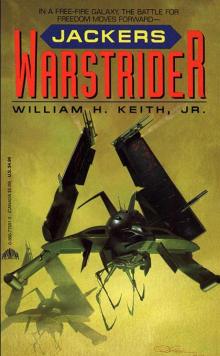 Jackers
Jackers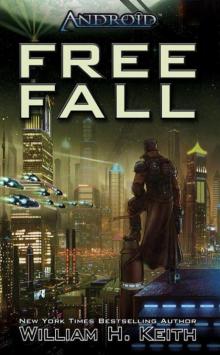 Android: Free Fall
Android: Free Fall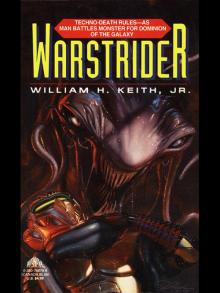 Warstrider 01 - Warstrider
Warstrider 01 - Warstrider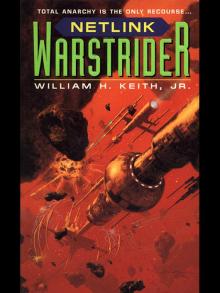 Warstrider 05 - Netlink
Warstrider 05 - Netlink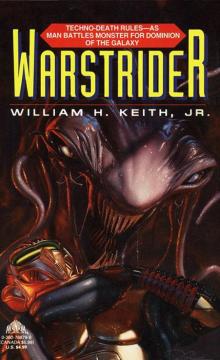 Warstrider
Warstrider